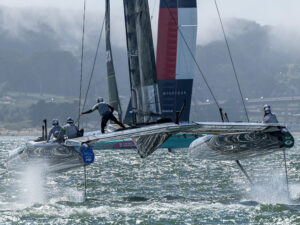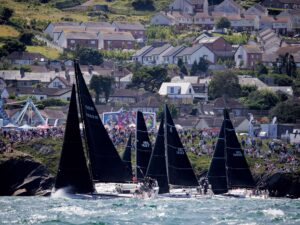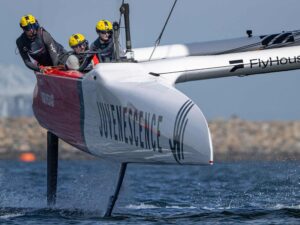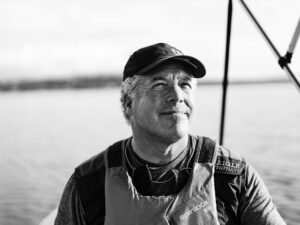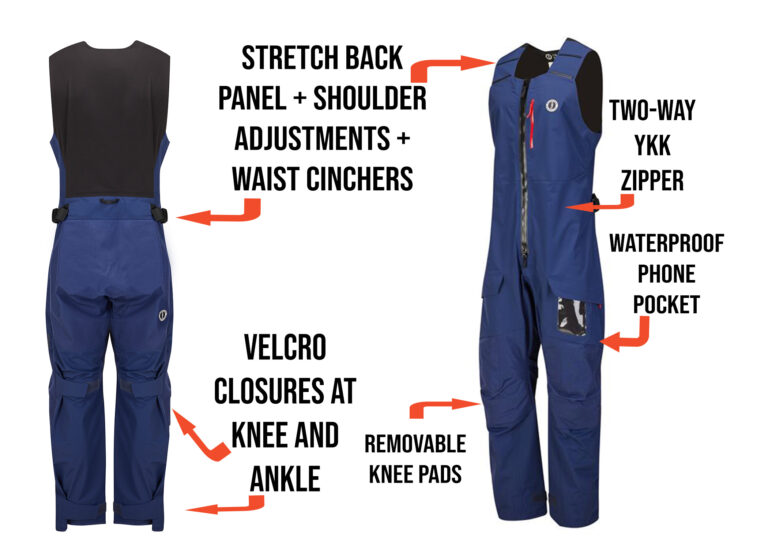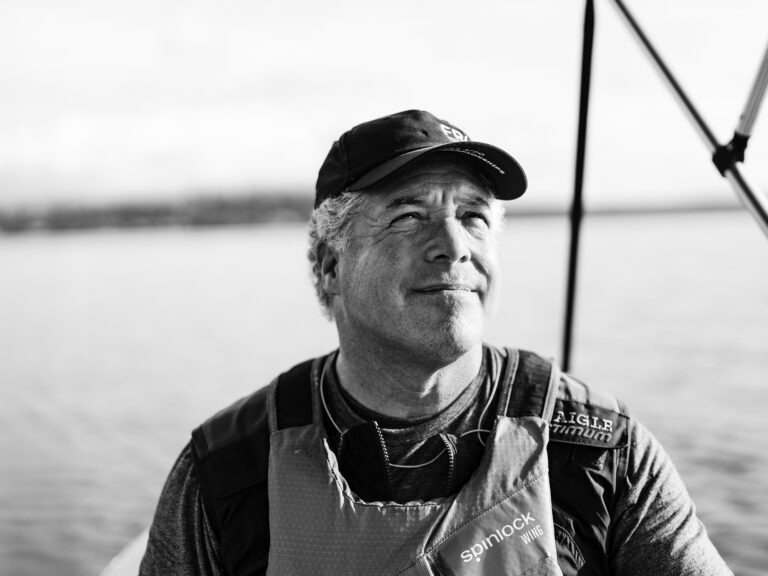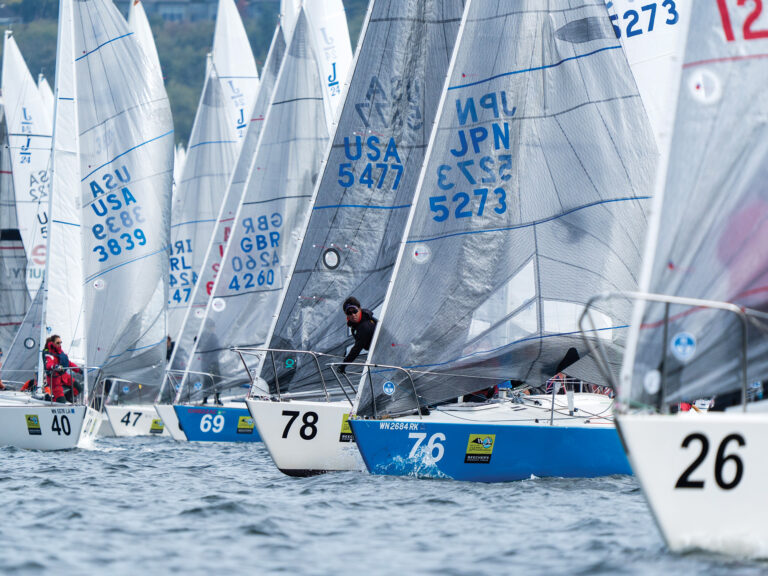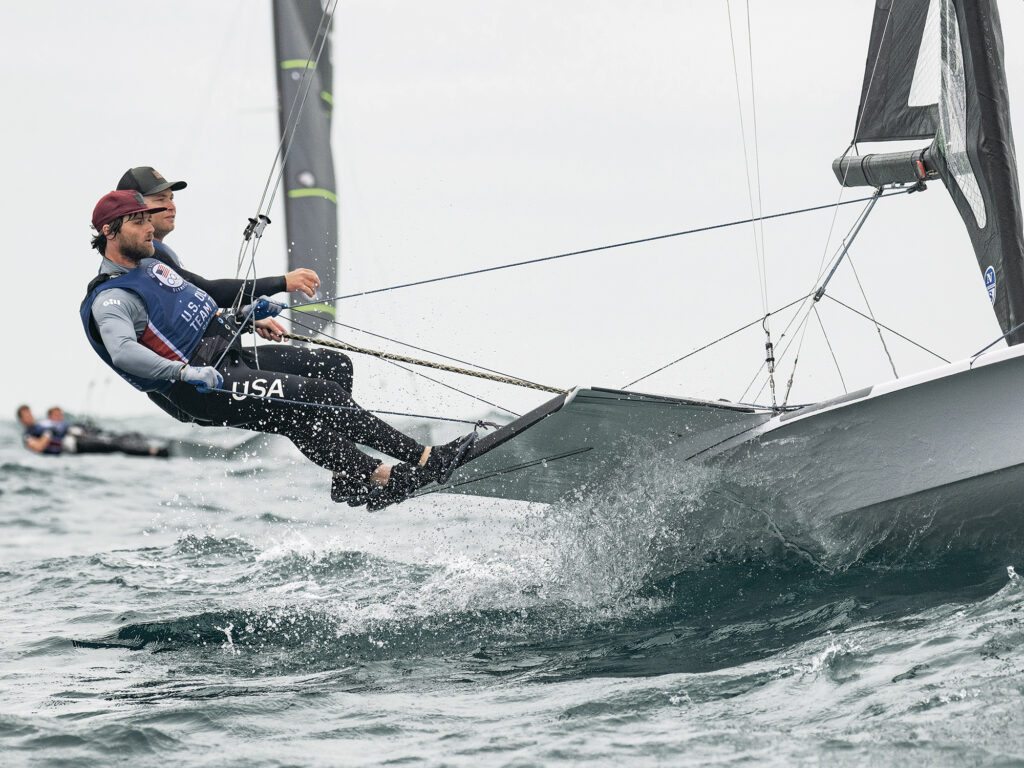
The top-three teams in the standings had traded places in the top 10 on the world stage for three years. They had trained together and qualified the US for the Games this past summer in the Netherlands. And all three pairs had swallowed the bitter pill of missing country qualification in the 49er for the Tokyo Olympics. Now, having been nearly tied on points for a week, they had only one goal—to beat one another.
By this point in the regatta, Ian Barrows and Hans Henken, teammates since summer 2020, had virtually secured the berth. But on the sail out to the racecourse, they followed their usual routine of hoisting the spinnaker and testing how far they could put the pedal down while running downwind in a big breeze, a difficult point of sail in the for 49er no matter how talented the crew.
“We were 100 percent comfortable on starboard, no problem,” Henken recalls of their assessment that morning. “When we jibed to port, I had to flog the kite three times in a row. I told Ian, ‘Somebody is going to capsize today.’”
They knew right then that, tactically, port jibe would not be ideal to attack or try to outmaneuver another boat. It was a subtle observation, a slightly different shape of the murky blue-green chop heading in one direction. Their boathandling was flawless all week, and with a 2-2-3 score line on the last day, they won the 21-race trials by only 3 points.
Twenty-plus knots is the limit of 49er sailing. And they were right up against it on the final day of the US Olympic Team 49er selection trials on Miami’s Biscayne Bay, with eight teams and only a handful of races remaining to decide who would be racing next summer in Marseille, France, the Olympic venue.
“It’s expert-level; it’s strategic how hard to push,” says Charlie McKee, their regatta coach and a multiple Olympic medalist who, with his brother Jonathan, earned a bronze medal at the 2000 Olympics, the year the 49er was introduced to the Games. “It’s not a fear of capsizing. The fact that Hans does the risk/reward that easily in his head, that says something about him. They can be analytical, but they also have so much confidence in each other. It’s not false like, ‘I got this.’ It’s from all the systematic training they have done with their squad coach, Mark Asquith.”
What transpired during that tedious series in Miami was the culmination of nearly a decade of dedication by three teams collectively aspiring to reach their peak abilities and one day make it to the Olympics. The photos on land after the final races in Miami revealed a depleted group of sailors, friends and competitors who represent the first true medal hopes for the US in the 49er since the early 2000s.
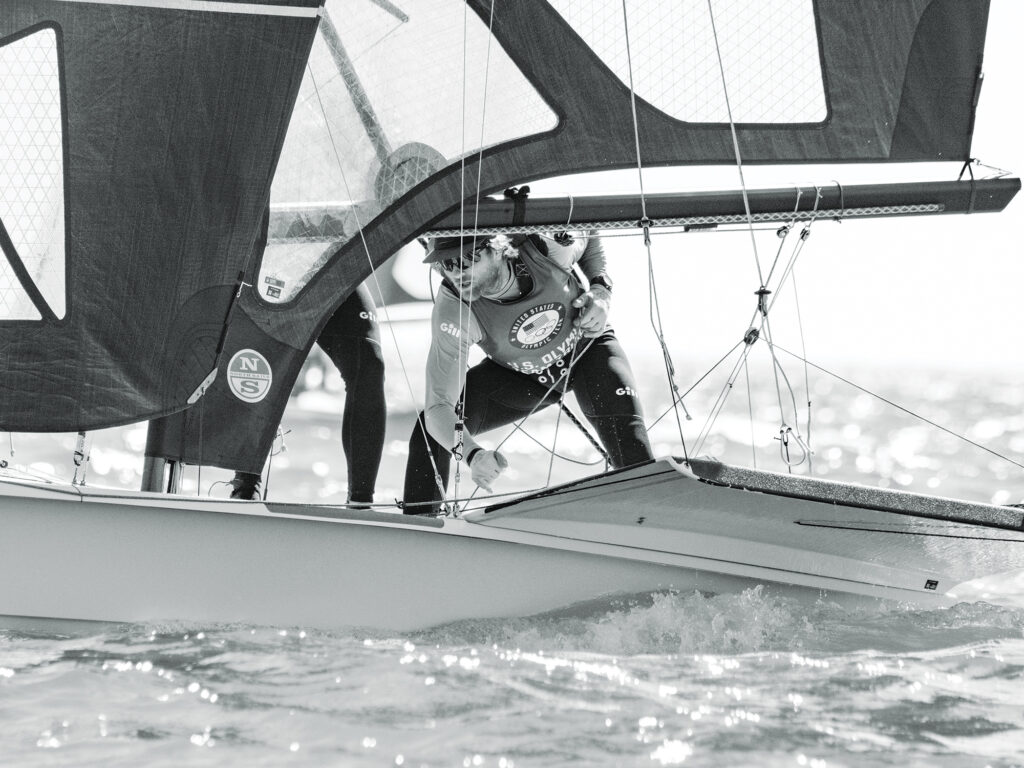
This squad, which shuffled partners after Tokyo, produced Barrows and Henken. And despite Henken’s near-career-ending injury months before the trials, the pair, winners of the 2023 Pan American Games, are now poised to achieve the seemingly impossible task of medaling at their first Olympic appearance. Citing a host of unique attributes and experiences, McKee and others say that they are ready.
Selecting sailors for the games varies by country. The United States once favored domestic selection trials, pitting sailors against each other to produce the best representative. This approach resulted in one of the most successful Olympic sailing programs of all time, but as domestic Olympic fleets shrank, the value of international competition grew. By the 2000s, to win a medal at the Games, it wasn’t good enough to be the best in the US anymore. The proving grounds were overseas. With only a handful of US medals won over the past few quads, however, a domestic trials format was reinstated for five classes.
The 2023 49er World Championship in the Netherlands saw Barrows and Henken and teammates Andrew Mollerus and Ian MacDiarmid finish in the top 10 (ninth and fifth respectively), which earned the US a 49er berth. All that remained was a one-regatta showdown between these two teams, and other favorites, Nevin Snow and Mac Agnese, to fill that berth.
This battle was a long time coming, particularly for Henken, who had raced in the domestic trials in the 49er class in 2007, and Barrows, who watched his brother Thomas win selection for the Rio Games. “Hans was a kid, got a boat, and sailed in his first trials,” McKee says. “It’s no coincidence that he got Olympic fever.”
Failing to qualify the US for the 2020 Tokyo Olympics was a massive blow to the American 49er program—and to the sailors themselves—but after a few crew switches, much of the squad was back to training within a few months.
“I made it clear to Ian a year before the 2021 World Championship [in Oman] that I wanted to be a contender in that fleet,” Henken says. If the pair had a mediocre finish, he would have called it quits. “This was a turning point, and we came away finishing fourth. This was the green light to say, ‘We have what it takes.’”
Barrows, from the US Virgin Islands, is predictably laid-back, a counterpoint to Henken’s fastidiousness. Henken is an engineer who would be designing rocket engines if he hadn’t committed to Olympic campaigning. He lives by the numbers. “We’ve logged every day together in an Excel spreadsheet,” he says. Since June 2020, they’ve sailed 1,300 days together.
“We’re still a young team,” Henken says. “A podium finish in Palma 2022 gave us confidence that we are players.” Finishing top 10 in two of the last three world championships, he adds, boosted their confidence going into the trials. “We knew that we were capable of winning; also, we beat the other two US teams at the last three small events.”
A defining moment of their campaign leading up to the trials was neither the epiphany at the Oman worlds nor their podium finishes. It was the frightening moment when Henken was injured in the cockpit of a foiling SailGP F50 in Taranto, Italy, this past September. What could have easily ended his career and his Olympic destiny turned out to be a test that Henken and Barrows saw as an opportunity to grow as a team.
Henken says that he was unconscious for five minutes and severely concussed, his sternum was broken in half, and four ribs were broken. The prospect of competing in the Pan American Games in October, which is perfect preparation for the Olympics, as well as the January trials were off the table.
“When I woke up in the hospital, I wasn’t sure I could walk,” Henken says. A patient recovery followed. “That’s kind of who I am. Any big goal, I plan to make step-wise goals. As unfortunate as it was. It fell into my wheelhouse. I told myself, It’s going to happen.”
Henken drew on his own determination and the experience of his wife, Helena Scutt, who recovered from a traumatic accident to compete in the 2016 Rio Games in the 49erFX, alongside Henken’s sister, Paris.
“Healing from my accident was a long process mentally in terms of PTSD,” Scutt says. “Just because someone looks fine, they can be a long way from feeling fine. It’s important for teammates, coaches and friends to recognize. I’ll be looking out for Hans.”
For 49er crews, there’s a constant balancing act between training on the water and time in the gym, and when the decision was made to try to sail the Pan Am games, Barrows and Henken knew that their training efforts would be quite compromised.
“Hans likes to have everything perfectly in place. The boat, his body. The good part of this situation was that it took Hans out of his comfort zone,” McKee says. “But if there’s ever a partner to have who wouldn’t be phased, it’s Ian. Hans knew that Ian was fine with everything. It’s a hugely positive character trait. That’s not going to knock him off his game. He can perform well in less-than-ideal circumstances.”
“Honestly, Hans is a pretty freak athlete,” Barrows says. He had to steer more gingerly through maneuvers during the Pan Am games to allow Hans to find his footwork. They estimate that Henken was at 60 percent ability at the Pan Am games and 80 percent by the trials. “At the Games, he was a little beat up, but at the trials, I didn’t notice anything.”
“We’re both incredibly hard workers,” Henken adds. “We’re always uncovering that ‘next thing.’ And when things don’t go our way, we say, ‘OK, this is part of the plan,’ and we start working for the next solution.”
“We were next to the boat that we had to beat the entire time,” Barrows says about his trials experience. “The adrenaline was always pumping.” They had the confidence of their Pan Am win and Henken’s remarkable recovery to push them through the marathon regatta. “We had no dip in focus,” Henken says. “The whole event, we stayed positive.”
During training blocks, Asquith would run the 49er squad around a weather mark “tip to tail,” with each team taking their turn at the back of the lineup. They’d race a course, dozens of times, keeping track of scores. The average placing for the winner was always a 2. “Because of this, at the trials, we used this idea that when you’re behind, don’t panic,” Henken says. “Not having that panic, ever, and this idea that this was going to work played a big role in our win.”
McKee says that the reason they never lost faith is because “they knew the trials was going to be that way. They fully expected it, and were mentally prepared for it.”
Going into the last day of the trials, Barrows and Henken had a slight lead, with three races remaining. “They knew the scenario where they could clinch the regatta in the second race of the day, if things went their way,” McKee says.
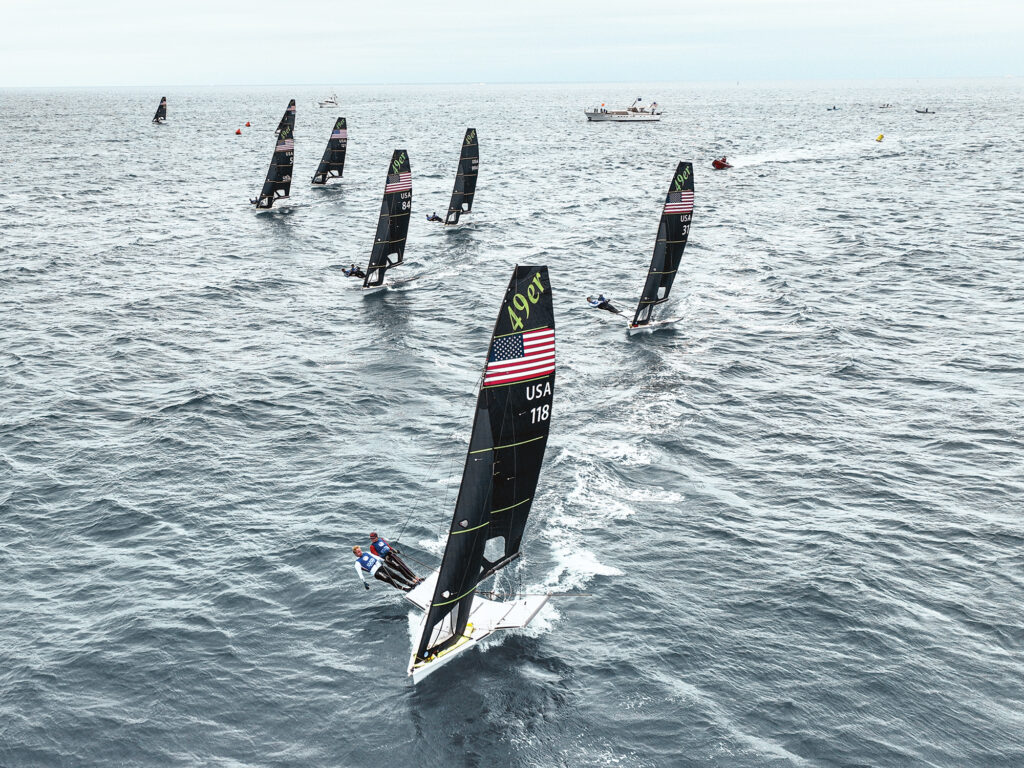
The pair knew that the right side of the racecourse was favored; they were in third place as they sailed up the second beat and needed a second to secure the regatta win with one race to spare. With the second place doing a bear-away set, Barrows and Henken did a perfect jibe set. They nailed the layline for the finish, got the second they needed, and their ticket was in hand.
“They had been sailing contained and controlled,” McKee says. “But because the analytics justified the maneuver, and they matched Ian’s tactical instincts and Hans trusted him, it worked. It never entered their minds that they could flip in a jibe set.”
True to the lessons learned from Asquith’s repetitive drill, the winning team had a pile of second-place finishes in their score line: 10 of 21 races, to be precise. “It was such a marathon of a regatta,” Barrows says. “On the way in, Hans started to do his normal boat check. And I said: ‘What are you doing? We’re done!’”
The final score had Barrows and Henken 3 points ahead of Mollerus and MacDiarmid, with Snow and Agnes a mere point behind. The differences were tiny over the course of such a grueling series. “They are very good at boathandling,” McKee says. “Ian has these skills where he knows what the boat can do. There were no boathandling mistakes. It’s amazing, after 21 races, 84 legs.”
Because this will be the first Olympic appearance for Barrows and Henken, the statistics for medal success are not in their favor, but the Games are famous for producing miracles. “When you go to your first Olympics, even if you’re good, you don’t usually do well,” McKee says. “The second time is usually when you win a medal.”
However, he sees something different in Barrows and Henken. “Some people cope [with the Olympic experience] by saying, ‘It’s just another regatta.’ We as coaches don’t think that’s realistic,” he says. “There’s no way to pretend. Ian and Hans are in a position to face that. They’re not going to be mentally taken out by that. That’s just not who they are.”
The pair are fortunate to have two significant experiences simulating the Olympic experience: They sailed in the 2022 Olympic Test Event in Marseille and won the Pan Am games in Chile, which certainly count for something. “I knew that [Pan Am games] experience was going to pay dividends,” Barrows says about the regatta. “We took a lot of notes about what we can control and what we can’t.”
As they now settle into a new rhythm in sync with the Olympic countdown, Barrows says that understanding each other’s needs is most important, as is recognizing when to relax and knowing when they’ve done enough. The trials are over. The berth is theirs. They earned it. And while it was mentally and physically draining, they are now brimming with determination.

